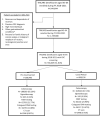Disparities in the use of colorectal cancer screening in a universally insured population during the COVID-19 pandemic
- PMID: 37644735
- PMCID: PMC10524012
- DOI: 10.1002/cam4.6400
Disparities in the use of colorectal cancer screening in a universally insured population during the COVID-19 pandemic
Abstract
Background: Despite the known efficacy of colorectal cancer (CRC) screening, the rates of individuals undergoing such testing have remained lower than target thresholds, even prior to the healthcare disruptions associated with the COVID-19 pandemic. We evaluated the impact of the COVID-19 pandemic on CRC screening within a nationally representative US population and assessed disparities in screening across racial/ethnic groups and socioeconomic (SES) strata.
Methods: We performed a retrospective cross-sectional study using all eligible TRICARE beneficiaries aged 45-64 years between FY 2018 and 2021. High-risk individuals, those with a previous or current CRC diagnosis, and/or a personal/family history of colonic polyps, were excluded. The pre-COVID-19 period (September 1, 2018-March 31, 2020) was compared to the COVID-19 period (April 1, 2020-September 30, 2021). Secondary analyses were performed, evaluating the interaction between the COVID-19 time period, race, and our proxy for socioeconomic status.
Results: During the study period, we identified 1,749,688 eligible individuals. Following the onset of the COVID-19 pandemic, CRC screening overall decreased from 34% in the pre-pandemic period to 30% following the onset of the pandemic (p < 0.001). This finding persisted even after adjusting for confounders in multivariable analysis (odds ratio [OR] for the pandemic timeframe: 0.79; 95% CI: 0.27, 0.31; p < 0.001). In the setting of SES, in the pandemic period, the odds of individuals from both Senior Enlisted (OR: 0.55; 95% CI: 0.54, 0.56) and Junior Enlisted sponsor ranks (OR: 0.27; 95% CI: 0.25, 0.30) were diminished as compared to Senior Officers.
Conclusions and relevance: We found a 21% reduction in the odds of CRC screening in the context of the COVID-19 pandemic. Reductions in colonoscopies and other types of screening tests were not offset by changes in the use of at-home tests such as Cologuard.
Keywords: cancer prevention; colorectal cancer; epidemiology and prevention; screening.
© 2023 The Authors. Cancer Medicine published by John Wiley & Sons Ltd.
Conflict of interest statement
The contents, views, or opinions expressed in this manuscript are those of the author(s) and do not necessarily reflect the official policy or position of the Uniformed Services University of the Health Sciences, the Department of Defense, or the Departments of the Army, Navy, or Air Force, or the Henry M. Jackson Foundation for the Advancement of Military Medicine, Inc. Mention of trade names, commercial products, or organizations does not imply endorsement by the US Government. The authors declare they have no conflicts of interest.
Figures
References
-
- American Cancer Society . Key statistics for colorectal cancer . 2023. Accessed January 20, 2023. https://www.cancer.org/cancer/colon‐rectal‐cancer/about/key‐statistics.html
-
- National Cancer Institute . Cancer stat facts: colorectal cancer . 2023. Accessed January 20, 2023. https://seer.cancer.gov/statfacts/html/colorect.html
-
- Centers for Disesae Control and Prevention . Health and economic benefits of colorectal cancer interventions . 2022. Accessed January 20, 2023. https://www.cdc.gov/chronicdisease/programs‐impact/pop/colorectal‐cancer...
Grants and funding
LinkOut - more resources
Full Text Sources
Miscellaneous


